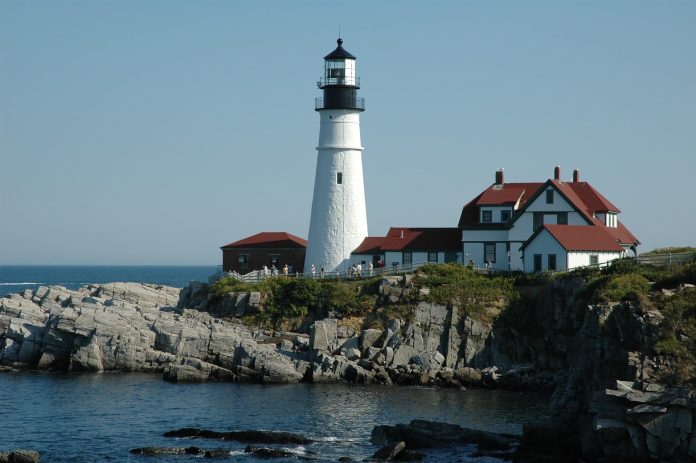Future Past by Casey Walsh
I’ve been craving just one good beach day all summer, nothing to do but lie in the sun and gaze at the peaceful horizon. There’s something hopeful about looking out at the sea, as though you can see the past and the future, all there in the shimmering expanse of blue. Beyond the children on the sand and in the shallow water, past the more capable swimmers and surfers and the small vessels, ocean kayaks and canoes and catamarans, farther even than the cargo and cruise ships miles out, there is, at some point, nothing but sea and sky, no hint of a destination. No end in sight.
I’ve finally had the day I dreamed of—two of them in fact—at Good Harbor Beach in Gloucester, MA. My husband, Kevin, and I spent a couple of days there and two more in Newburyport, just what we’ve needed as fall closes in. Now we settle in for a meandering drive home, including a planned detour north along the coast.
Leaving Newburyport’s historic downtown, I assume my role as navigator to Kevin’s as driver. When we first began this alliance, my task typically involved paper maps. Now, though, it’s a dance of devices. As we drive over the Merrimack River on Route 1, I plug the address into the dashboard GPS, and while it calculates, I alternate between checking the Maps app and the radar on my iPhone. Glancing up to admire the boats in the inland harbor, I plan our route and hope the weather will hold while we explore Portsmouth, NH.
For the past few days, I’ve been focused on local treks, how to get from our hotel into town or from one hotel to the next. But as we turn off onto 1a—the scenic road along the coast—I take a broader look at our surroundings. It surprises me we’re so close to Hampton Beach, the crowded honky-tonk seaside scene my first husband and I had thought was fun back in the dark ages, before kids, when we still believed we’d be together forever. It won’t take Kevin and me long to reach Portsmouth. We’ll get a feel for the city, browse the shops, and grab a bite to eat before heading home to Albany.
Scrolling up on my phone as we drive, I see the places where my high school friends spent yearly summer vacations with their families: Kittery, York, Ogunquit, Wells, Old Orchard Beach, places I only dreamed of. I scroll still more, farther up than I remember, and there it is: South Portland.
Suddenly, it’s fall 1997 again, and I’m driving east across Massachusetts, then up into New Hampshire with my oldest son, Eric. We reached the outskirts of Portsmouth, then ventured on into Maine, past exits for beach towns, and finally arrived in South Portland. I was instantly enchanted by this small city, with its cobblestone streets and cyclists and parks, as we drove along the mouth of the Fore River. I pictured Eric here in the fall, riding his bike to a job in town, making a little cash to keep him afloat.
Eric and I drove out of downtown and out toward the water, where the Spring Point Ledge Lighthouse marks a dangerous obstruction on the west side of the main shipping channel into Portland Harbor. Like most lighthouses, its distinctive beam patterns, varied sequences of light and dark, not only warn sailors of hazards but help them find their position as well.
Beautiful as it is, the lighthouse was not our destination. We were here to see the campus of South Portland Technical College, where the lighthouse is located on a breakwater at the tip.
Earlier in the year, I’d ventured into Eric’s high school guidance office asking for information about colleges for him. While the counselors offered personalized support to top-tier students, they paid little attention to kids like my son—those who had caused more headaches than pride for faculty in recent semesters. Screw ups…I believe that was the technical term. I was fairly certain the only way we’d figure out the right direction was for me to show up in person, put my best intelligent, efficient foot forward, and ask all the right questions. Essentially, I would stand in for Eric: patiently navigate the information, lay out his options, and apply just the right spin to help him see all the world could offer outside of Cambridge, our small upstate New York village.
Predictably, the counselors were busy, busy, busy, but they could steer me to a computer with a program that allowed a filtered search. Carefully, as though his life depended on it, I entered my criteria, channeling Eric as best I could: Industrial Drafting and Design. Dorms. Intercollegiate soccer program. Bingo. South Portland Technical College it is, I thought, within driving distance yet far enough to allow him to see what’s out there.
I gathered materials and made my pitch. Eric was surprisingly enthusiastic, devouring the catalogs, and soon we were planning a visit. I remember the tour, Eric realizing he’d had such good preparation at Cambridge, having already taken many courses in high school not available to some of the other students on the tour. And the coach was bursting with enthusiasm for what Eric would add to the team. All spring phone calls and letters arrived from the college, encouraging Eric to keep up his grades and updating him on who had been recruited, what promise lay ahead.
“By the time I graduate, I will have made so many new friends, snowboarded on the toughest mountains, and played college soccer,” he’d said with his trademark grin, slipping into the future past tense that swelled with optimism.
“Ah, but first you have to do well on that chemistry exam,” I’d teased.
From Eric, in characteristic form: “Thank you, Captain Obvious.”
After years of guiding him through life closer to home, it seemed he, too, was ready to broaden his view to a world that just might include South Portland.
None of this would ever be. In the end, Eric settled on a local community college rather than leave his on-again off-again girlfriend, who had somehow completely drowned his ability to imagine a future on his own. That semester was a bust; partying and killing time killed all of his focus and enthusiasm for life. Afterward, he floundered for a while, searching for a path until he chose the Navy. He scored so well on the ASVAB that he was selected for aircraft technician school in Pensacola, FL, following completion of naval basic training in Illinois. If only he would stay the course.
Yet each of these options was somehow part of the tornado of trouble, the huge disturbance that had already begun its wreckage and was simply too big to fail. Though they offered brief glimmers of possibility, it was obvious even then that they were never to be. There would be stressors of a divorce that no amount of my own intelligence or efficiency could allay, adults who let him down, bad decisions and bad luck. There would be factors even I, the better part of two decades later, couldn’t begin to understand. Ultimately, a tragic crash would end his life.
Still, I remember so well how South Portland, where it all began, had a different vibe entirely. It seemed its lighthouse—which had protected seafaring travelers on Casco Bay from all sorts of dangers for more than a century—had the power to keep my son safe as well. But first he would have had to get there. Once Eric had turned away from that beam of hope, he lost his way. With nothing but sea and sky, no hint of a destination, there was no end in sight.
I squirm in my seat next to Kevin, who is oblivious to the places I’ve gone in my mind. Staring out the window at the sand and the waves, I feel the lump form in my throat, feel the tears form, hot and insistent. I let them wash over me. I’ve learned there’s no use in the fight, anyway. It’s a mystery to me, how I can feel so resolved at times, accepting of Eric’s life and of his passing as what was. What is. Then come days like this one, when everything is so present, invading my thoughts, refusing to share space with my current life, teasing me with visions of the life he never had.
I think of something I heard years ago—how sadness is missing what has been lost, but sorrow is missing what will never be—and I’m overcome with a rare wave of anxiety, something I haven’t felt in quite this way since the day Eric dashed out the front door that one last time. If only I could reach back and change one little thing, it all so easily could have happened for him. He’d been so damn close. I picture Kevin and me driving to Maine to visit Eric and his wife and outdoor-loving, risk-taking kids living out their happy lives in an idyllic seaside town. It tortures me.
I sit silently for a while as we drive along the coast, wallowing really, and fantasize about the student Eric could have been—living in the dorms, playing on the soccer team, making new friends on campus and in town, enjoying the ocean views that might have inspired him as they do me. Caught in the past, I’ve been exercising my best Google-fu, frantically searching for the online home of the place that had once drawn us in, frustrated that SPTC seems to have vanished along with the life I imagined for my son, and for me. Using the lighthouse as the beacon it was meant to be, I finally locate Southern Maine Community College on the web, the same campus anointed with a new name, another entity entirely. How like my own life, it strikes me, completely rewritten, though some of the old remains in different form. Still, the college will never again be what it was on that day, at that time.
And neither will I.
I notice we’re about to reach Portsmouth. Kevin and I are on vacation, after all, and I owe it to him to at least attempt to come up for air. “Hey, listen to this,” I offer, feigning enthusiasm, hoping the feelings will follow. “They even have a comic book on their website describing the lighthouse and its origins.”
Step Into History! the title commands.
If only it were history, I think, not a future imagined but never fulfilled.
I close the app, drop the phone into my bag, and turn my eyes to the road ahead.
Casey Walsh is a writer and former speech-language pathologist living with her husband in West Sand Lake, New York. Learn more at www.caseymulliganwalsh.com.


Lush and beautiful. I take the trip up that coast with you and recall how magical it is there, what a different life I had when I lived south of Portland, how sorrow and gratitude mix for me as I read this beautiful piece.